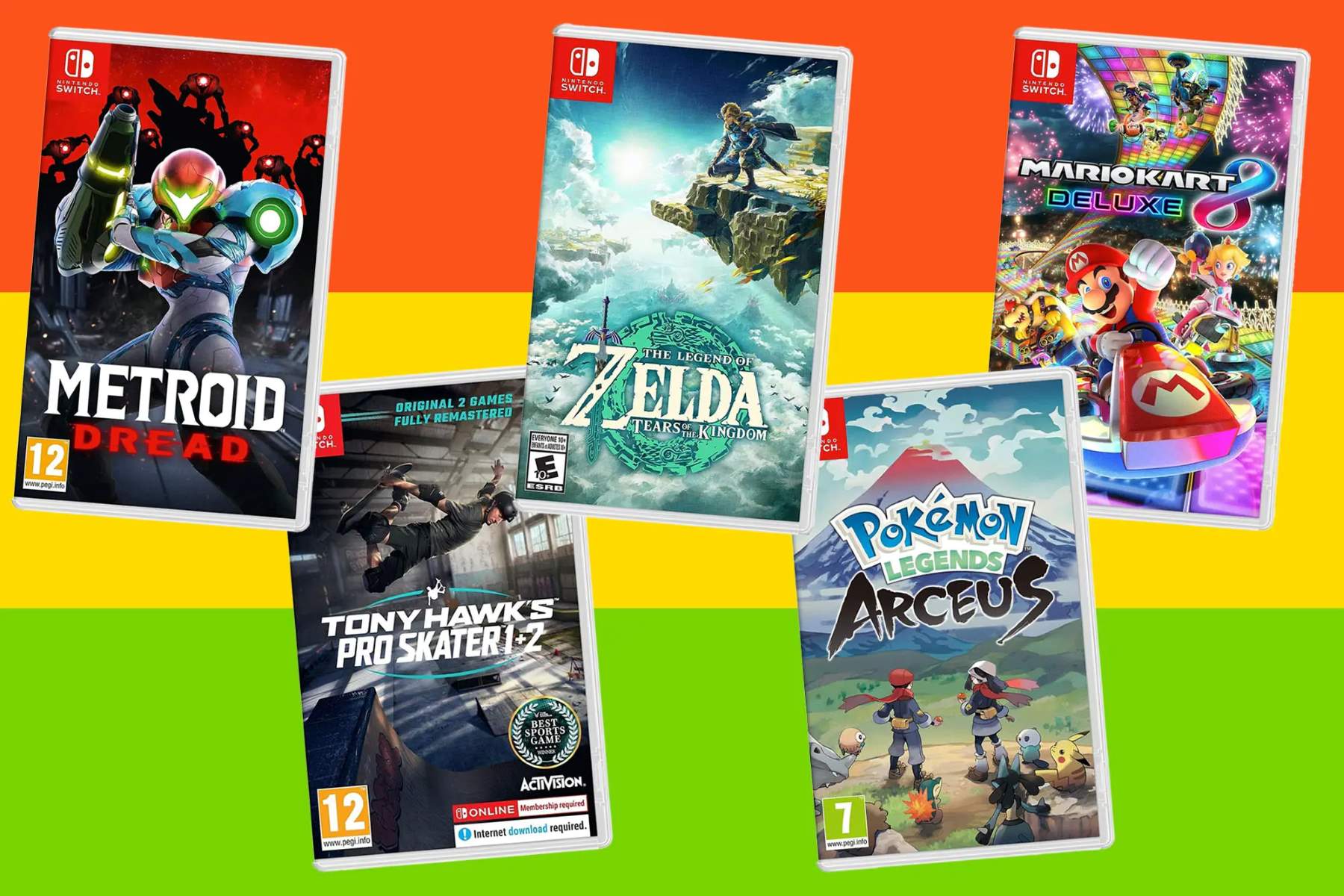Home>Arts and Culture>10 Influential Indie Games That Shaped The Gaming Industry


Arts and Culture
10 Influential Indie Games That Shaped The Gaming Industry
Published: February 9, 2024
Discover how 10 influential indie games have shaped the gaming industry, exploring their impact on arts and culture. Explore the evolution of gaming through these groundbreaking titles.
(Many of the links in this article redirect to a specific reviewed product. Your purchase of these products through affiliate links helps to generate commission for Regretless.com, at no extra cost. Learn more)
Table of Contents
Minecraft
Minecraft is a game that has left an indelible mark on the gaming industry. Developed by Markus Persson and later published by Mojang Studios, it was released in 2011 and quickly became a cultural phenomenon. At its core, Minecraft is a sandbox game that allows players to explore, create, and survive in a blocky, pixelated world.
The game's open-ended nature and emphasis on creativity have made it a favorite among players of all ages. In Minecraft, players can gather resources, build structures, and engage in various activities such as farming, mining, and crafting. The game's simple yet versatile mechanics have empowered players to unleash their imagination and construct elaborate worlds limited only by their creativity.
One of the most remarkable aspects of Minecraft is its impact on the gaming community. It has fostered a vibrant modding scene, enabling players to modify and customize the game to suit their preferences. This has led to the creation of countless mods, custom maps, and user-generated content, further enriching the Minecraft experience and extending its longevity.
Moreover, Minecraft has transcended the gaming realm and permeated popular culture. Its blocky aesthetic and iconic characters have become synonymous with modern gaming, featuring in merchandise, spin-off games, and even educational programs. The game's educational potential has been harnessed to teach various subjects, including history, architecture, and coding, making it a valuable tool for educators and learners alike.
From a business standpoint, Minecraft's success has been nothing short of extraordinary. Microsoft acquired Mojang Studios in 2014 for a staggering $2.5 billion, a testament to the game's enduring appeal and commercial viability. The acquisition has not only ensured the continued development and support of Minecraft but has also paved the way for new innovations and expansions, such as the introduction of virtual reality and augmented reality experiences.
In essence, Minecraft has revolutionized the gaming landscape, demonstrating the profound impact of indie games on the industry. Its influence extends far beyond entertainment, inspiring creativity, fostering community, and redefining the possibilities of interactive experiences. As Minecraft continues to evolve and captivate new generations of players, its legacy as a groundbreaking indie game remains unassailable.
Read more: 10 Best Offline Games For IPhone
Undertale
Undertale, developed by Toby Fox and released in 2015, is a game that defies traditional conventions and resonates deeply with players worldwide. At its core, Undertale is a role-playing game that subverts expectations, blending compelling storytelling, innovative gameplay mechanics, and a captivating soundtrack to deliver a truly unique experience.
One of the defining features of Undertale is its emphasis on player choice and consequence. Throughout the game, players are presented with moral dilemmas and ethical decisions that directly impact the narrative and characters they encounter. This non-linear approach to storytelling not only immerses players in the game's world but also challenges them to consider the repercussions of their actions, fostering a sense of emotional investment and personal responsibility.
The game's characters are another standout element, characterized by their depth, complexity, and memorable interactions. From the quirky skeleton brothers Sans and Papyrus to the enigmatic and charismatic robot Mettaton, each character in Undertale is meticulously crafted, offering nuanced personalities and engaging backstories. This attention to character development has endeared Undertale to players, fostering a strong emotional connection and prompting widespread fan appreciation and creative expression.
Undertale's innovative combat system further distinguishes it from traditional RPGs. Players can choose to resolve conflicts through non-violent means, introducing a refreshing approach to gameplay that encourages empathy and compassion. This departure from the typical combat-centric gameplay not only reinforces the game's underlying themes of empathy and understanding but also underscores its commitment to subverting genre norms and challenging player expectations.
The game's soundtrack, composed by Toby Fox himself, has also garnered widespread acclaim for its evocative melodies and thematic resonance. The music seamlessly complements the game's narrative and gameplay, enhancing emotional moments and immersing players in the rich tapestry of Undertale's world.
Undertale's impact extends beyond its initial release, inspiring a dedicated fan community and a myriad of fan works, including fan art, music covers, and fan fiction. The game's enduring legacy is a testament to its ability to captivate and resonate with players on a profound level, transcending the boundaries of traditional gaming experiences.
In summary, Undertale stands as a testament to the transformative power of indie games, demonstrating how a small, independent project can defy conventions, resonate with audiences, and leave an indelible mark on the gaming industry. Its emphasis on player agency, rich characterizations, innovative gameplay, and evocative storytelling has solidified its status as a modern classic, continuing to influence and inspire both players and game developers alike.
Stardew Valley
Stardew Valley, developed by ConcernedApe (Eric Barone), is a captivating indie game that has garnered widespread acclaim for its immersive gameplay, charming visuals, and nostalgic appeal. Released in 2016, the game presents players with the opportunity to escape the hustle and bustle of modern life and embark on a heartwarming journey to restore a neglected farm in the idyllic Pelican Town.
At its core, Stardew Valley encapsulates the essence of rural living, inviting players to cultivate their land, raise livestock, and engage with the vibrant community that thrives in the valley. The game's emphasis on wholesome activities, such as farming, fishing, foraging, and mining, fosters a sense of tranquility and purpose, providing an antidote to the frenetic pace of contemporary lifestyles.
One of the game's most compelling aspects is its richly detailed world, brimming with diverse characters, each with their own stories, personalities, and aspirations. Players can form meaningful relationships with the townsfolk, partake in seasonal festivals, and uncover the town's history, creating a sense of belonging and camaraderie that permeates every interaction.
Stardew Valley's open-ended gameplay allows players to chart their own path, whether it's pursuing agricultural mastery, delving into the depths of the mine, or contributing to the town's development through various community projects. This freedom of choice empowers players to shape their virtual existence, fostering a deep sense of agency and fulfillment.
Furthermore, the game's evocative soundtrack, composed by ConcernedApe himself, complements the serene ambiance of the valley, enhancing the immersive experience and evoking a nostalgic sentiment reminiscent of classic 16-bit era games. The attention to detail in the game's visuals and sound design contributes to its timeless charm, resonating with players of all ages.
Stardew Valley's impact extends beyond its status as a beloved game; it has served as an inspiration for other indie developers and has reinvigorated interest in the farming simulation genre. Its success has demonstrated the enduring appeal of heartfelt storytelling, captivating gameplay, and the power of a single developer's vision to captivate a global audience.
In essence, Stardew Valley stands as a testament to the transformative potential of indie games, showcasing how a labor of love can blossom into a cultural phenomenon. Its endearing portrayal of rural life, emphasis on community and self-discovery, and timeless appeal have solidified its status as a modern classic, continuing to enchant and inspire players seeking respite in its bucolic splendor.
Limbo
Limbo, a hauntingly atmospheric indie game developed by Playdead, made its debut in 2010 and swiftly captivated players with its evocative visual style and immersive gameplay. Set in a monochromatic world fraught with peril and mystery, Limbo plunges players into a surreal journey as they guide a nameless boy through treacherous environments in search of his missing sister.
From the moment players step into the eerie realm of Limbo, they are enveloped in a palpable sense of foreboding and uncertainty. The game's striking black-and-white aesthetic, punctuated by stark contrasts and ambient lighting, creates a mesmerizing backdrop that heightens the feeling of isolation and apprehension. Every meticulously crafted environment, from dense forests to derelict industrial landscapes, exudes a sense of desolation and intrigue, drawing players deeper into the enigmatic world.
The gameplay mechanics of Limbo are ingeniously designed to immerse players in a harrowing yet captivating experience. As the protagonist navigates the treacherous terrain, players encounter a myriad of puzzles, obstacles, and deadly traps that demand keen observation and precise timing to overcome. The game's intuitive controls and seamless integration of physics-based challenges elevate the sense of immersion, compelling players to strategize and adapt to the ever-evolving dangers that lurk in the shadows.
What sets Limbo apart is its masterful storytelling through environmental cues and subtle nuances. Without relying on conventional dialogue or exposition, the game weaves a narrative tapestry that invites interpretation and introspection. Each harrowing encounter and enigmatic encounter serves as a piece of a larger, enigmatic puzzle, inviting players to unravel the mysteries shrouding the protagonist's odyssey and the world he traverses.
The evocative sound design of Limbo further enriches the immersive experience, enveloping players in an ethereal soundscape that complements the game's visual splendor. From the haunting echoes of the environment to the subtle cues that foreshadow impending perils, the audio elements of Limbo contribute to the game's immersive ambiance, evoking a profound emotional resonance that lingers long after the journey concludes.
Limbo's impact on the gaming industry has been profound, inspiring a new wave of indie games that prioritize atmospheric storytelling and immersive gameplay. Its success has underscored the enduring appeal of indie titles that dare to defy conventions and evoke powerful emotions through minimalist yet evocative design.
In essence, Limbo stands as a testament to the artistic and narrative potential of indie games, demonstrating how a carefully crafted experience can transport players to realms of profound beauty and haunting melancholy. Its legacy as a groundbreaking work of interactive art continues to resonate with players, reaffirming the transformative power of indie games in shaping the landscape of interactive storytelling.
Braid
Braid, developed by Jonathan Blow and released in 2008, stands as a seminal work in the realm of indie games, captivating players with its inventive gameplay mechanics, evocative storytelling, and distinctive artistic style. At its core, Braid is a puzzle-platformer that deftly intertwines time manipulation with intricate level design, offering players a thought-provoking and emotionally resonant experience.
The game's central mechanic, the ability to manipulate time, serves as the linchpin of its gameplay and narrative. Players assume the role of Tim, a protagonist on a quest to rescue a princess from an enigmatic antagonist. What sets Braid apart is the ingenious incorporation of time manipulation into every facet of the game, from solving intricate puzzles to unraveling the underlying themes of regret, longing, and the passage of time.
Each world in Braid presents a unique temporal twist, challenging players to rethink their approach to problem-solving and platforming. The game's non-linear structure encourages players to experiment with time manipulation, rewinding and altering the flow of events to uncover hidden solutions and traverse seemingly insurmountable obstacles. This innovative approach not only elevates the gameplay to new heights but also reinforces the game's thematic exploration of consequences and the elusive nature of time itself.
Beyond its gameplay innovations, Braid's narrative depth and symbolism have left an indelible impression on players. The enigmatic story unfolds through cryptic text passages and evocative visual imagery, inviting interpretation and introspection. As players delve deeper into the narrative tapestry, they encounter themes of love, loss, and the intricacies of human relationships, challenging them to contemplate the implications of their actions within the game and in their own lives.
The game's hand-painted art style, characterized by vibrant colors and dreamlike landscapes, further enhances the immersive experience, enveloping players in a world that teems with beauty and mystery. The meticulously crafted visuals, coupled with a hauntingly evocative soundtrack, create an ethereal ambiance that complements the game's thematic depth, evoking a sense of wonder and contemplation.
Braid's impact on the gaming industry has been profound, inspiring a renaissance of puzzle-platformers that prioritize artistic expression and cerebral gameplay. Its success has underscored the enduring appeal of indie games that push the boundaries of interactive storytelling and challenge players to engage with thought-provoking themes.
In essence, Braid stands as a testament to the transformative potential of indie games, showcasing how a singular vision can weave a rich tapestry of gameplay innovation, narrative depth, and artistic expression. Its legacy as a pioneering work of interactive art continues to resonate with players, reaffirming the profound impact of indie games in shaping the landscape of interactive storytelling.
Read more: 10 Inappropriate Games We Played As Kids!
Super Meat Boy
Super Meat Boy, developed by Team Meat and released in 2010, stands as a testament to the enduring appeal of challenging platformers and the creative ingenuity of indie game development. At its core, Super Meat Boy delivers a relentless and exhilarating experience that demands precision, agility, and unwavering determination from players as they guide the eponymous Meat Boy on a perilous quest to rescue his beloved Bandage Girl from the nefarious Dr. Fetus.
The game's unyielding difficulty curve, coupled with its tight controls and responsive mechanics, creates a sense of exhilaration and accomplishment as players navigate through a myriad of treacherous obstacles and diabolical hazards. From razor-sharp saw blades to cascading torrents of lethal fluids, each level presents a formidable challenge that pushes players to hone their reflexes and master the art of precise platforming.
What sets Super Meat Boy apart is its unapologetic embrace of difficulty as a defining feature rather than a deterrent. The game's rapid respawn system ensures that players can instantly retry levels, fostering a sense of continuous improvement and perseverance. This design philosophy encourages players to embrace failure as an integral part of the learning process, transforming setbacks into opportunities for growth and mastery.
The game's vibrant and whimsical art style, complemented by a frenetic and adrenaline-pumping soundtrack, creates a captivating and immersive experience that energizes players as they confront each daunting stage. The charmingly grotesque characters, coupled with the game's irreverent humor and playful nods to gaming culture, infuse Super Meat Boy with a distinct personality that resonates with players and fosters a sense of camaraderie in the face of seemingly insurmountable challenges.
Super Meat Boy's impact on the gaming landscape has been profound, inspiring a resurgence of interest in challenging platformers and serving as a touchstone for indie developers seeking to imbue their games with a blend of relentless difficulty and unbridled creativity. Its success has underscored the enduring appeal of games that dare players to test their limits and embrace the thrill of overcoming seemingly impossible odds.
In essence, Super Meat Boy stands as a testament to the transformative potential of indie games, showcasing how a singular vision can captivate players with its exhilarating gameplay, vibrant artistry, and unyielding spirit. Its legacy as a pioneering work of interactive art continues to resonate with players, reaffirming the profound impact of indie games in shaping the landscape of challenging and rewarding gaming experiences.
Fez
Fez, a mesmerizing indie game developed by Polytron Corporation and released in 2012, stands as a testament to the transformative power of perspective-shifting gameplay and intricate world design. At its core, Fez invites players to embark on a whimsical and enigmatic adventure as they assume the role of Gomez, a 2D creature bestowed with the ability to perceive the world in three dimensions. This groundbreaking mechanic fundamentally alters the traditional platforming experience, introducing a captivating dimension of spatial exploration and puzzle-solving.
The game's central premise revolves around the manipulation of perspective, allowing players to rotate the game world to unveil hidden pathways, secrets, and cryptic symbols. This innovative gameplay mechanic not only challenges players to think in multiple dimensions but also imbues the world of Fez with a sense of wonder and discovery. Each rotation of the world unveils intricate details and hidden clues, inviting players to unravel the enigmatic mysteries that permeate the game's richly detailed environments.
What sets Fez apart is its meticulous attention to world-building and environmental storytelling. Every area in the game is meticulously crafted, brimming with visual intricacies, ancient ruins, and cryptic symbols that hint at a deeper underlying narrative. As players traverse the interconnected landscapes, they encounter a tapestry of cultural references, architectural marvels, and enigmatic artifacts, fostering a sense of immersion and curiosity that propels them deeper into the game's enigmatic lore.
Fez's evocative pixel art style, characterized by vibrant colors and intricate detailing, creates a visually stunning world that teems with life and mystery. The game's charmingly retro aesthetic, coupled with a mesmerizing ambient soundtrack, envelops players in an otherworldly ambiance that evokes a sense of nostalgia and awe. This seamless fusion of visual and auditory elements enhances the immersive experience, drawing players into a world that pulsates with hidden wonders and enigmatic beauty.
The impact of Fez on the gaming landscape has been profound, inspiring a new wave of indie games that prioritize environmental storytelling, non-linear exploration, and inventive gameplay mechanics. Its success has underscored the enduring appeal of games that challenge players to perceive the world from a fresh perspective, transcending the boundaries of traditional platformers and captivating audiences with its innovative approach to spatial manipulation.
In essence, Fez stands as a testament to the transformative potential of indie games, showcasing how a singular vision can transport players to realms of profound beauty and enigmatic allure. Its legacy as a pioneering work of interactive art continues to resonate with players, reaffirming the profound impact of indie games in shaping the landscape of immersive and thought-provoking gaming experiences.
Celeste
Celeste, a poignant indie game developed by Maddy Makes Games and released in 2018, stands as a testament to the transformative power of storytelling, mental health representation, and the art of overcoming personal challenges. At its core, Celeste invites players to embark on a deeply personal and emotionally resonant journey as they accompany the determined protagonist, Madeline, on her arduous quest to ascend the eponymous Celeste Mountain.
The game's narrative unfolds with remarkable sensitivity and depth, addressing themes of self-discovery, perseverance, and the complexities of mental health. As players guide Madeline through the treacherous mountain terrain, they bear witness to her internal struggles and moments of self-doubt, creating a profound sense of empathy and emotional investment. The game's unflinching portrayal of anxiety and self-acceptance resonates with players on a deeply personal level, fostering a powerful connection that transcends the virtual realm.
Celeste's gameplay mechanics are ingeniously crafted to mirror the protagonist's emotional journey, intertwining platforming challenges with the metaphorical landscape of mental health. Each screen presents a delicate balance of precision platforming and introspective storytelling, inviting players to confront their fears and insecurities alongside Madeline. The game's difficulty curve, while demanding, encourages perseverance and self-reflection, mirroring the protagonist's own resilience in the face of adversity.
What sets Celeste apart is its unwavering commitment to mental health representation and advocacy. The game's narrative deftly navigates the complexities of anxiety and self-doubt, portraying them with nuance and authenticity. Through Madeline's struggles and triumphs, players are offered a poignant portrayal of the human experience, fostering empathy and understanding for those grappling with similar challenges in their own lives.
The game's evocative pixel art style, complemented by a hauntingly beautiful soundtrack, creates an immersive and emotionally charged experience. The meticulously crafted visuals and resonant musical score intertwine seamlessly with the narrative, evoking a profound sense of empathy and introspection. Every pixel and note contributes to the game's emotional resonance, enveloping players in a world that pulsates with vulnerability and resilience.
Celeste's impact on the gaming industry has been profound, inspiring a new wave of games that prioritize emotional storytelling, mental health representation, and the power of empathy. Its success has underscored the enduring appeal of games that dare to address complex themes with sincerity and compassion, leaving an indelible mark on players and developers alike.
In essence, Celeste stands as a testament to the transformative potential of indie games, showcasing how a singular vision can illuminate the human experience with vulnerability, empathy, and unwavering hope. Its legacy as a pioneering work of interactive art continues to resonate with players, reaffirming the profound impact of indie games in shaping the landscape of emotionally resonant and empathetic gaming experiences.
Papers, Please
Papers, Please, a thought-provoking indie game developed by Lucas Pope and released in 2013, immerses players in the role of an immigration officer in the fictional dystopian country of Arstotzka. Set against the backdrop of political turmoil and social unrest, the game presents a harrowing simulation of bureaucratic responsibility and moral dilemmas, compelling players to navigate a morally gray landscape as they scrutinize documents, process entry permits, and make life-altering decisions that impact the fates of virtual strangers.
At its core, Papers, Please deftly intertwines gameplay mechanics with a compelling narrative that delves into themes of authoritarianism, empathy, and the human cost of political oppression. As players meticulously inspect documents for discrepancies and verify the authenticity of entrants' credentials, they are confronted with heart-wrenching scenarios that test their ethical compass. The game's branching narrative, influenced by players' choices and actions, underscores the weight of their decisions and the far-reaching consequences of their judgments.
What sets Papers, Please apart is its unflinching portrayal of the human toll of bureaucratic systems and the dehumanizing effects of unchecked authority. The game deftly captures the moral ambiguity inherent in the immigration officer's role, presenting players with gut-wrenching choices that force them to grapple with their own humanity in the face of systemic oppression. The palpable tension and moral quandaries that permeate the game's narrative invite introspection and challenge players to confront the ethical implications of their actions within the game and in the broader context of societal injustices.
Papers, Please's evocative pixel art style, characterized by stark visuals and subdued color palettes, creates a hauntingly immersive world that mirrors the bleakness of the game's dystopian setting. The game's minimalist yet evocative soundtrack further enhances the sense of unease and desperation, enveloping players in an atmosphere of palpable tension and moral ambiguity. Every pixel and note contributes to the game's immersive ambiance, evoking a profound sense of empathy and introspection.
The impact of Papers, Please on the gaming landscape has been profound, inspiring a new wave of narrative-driven games that challenge players to confront complex ethical dilemmas and systemic injustices. Its success has underscored the enduring appeal of games that dare to provoke introspection and empathy, leaving an indelible mark on players and developers alike.
In essence, Papers, Please stands as a testament to the transformative potential of indie games, showcasing how a singular vision can illuminate societal injustices with empathy, nuance, and unyielding introspection. Its legacy as a pioneering work of interactive art continues to resonate with players, reaffirming the profound impact of indie games in shaping the landscape of socially conscious and morally challenging gaming experiences.
Cave Story
Cave Story, an iconic indie game developed by Daisuke "Pixel" Amaya and initially released in 2004, stands as a timeless testament to the enduring allure of classic 2D action-adventure games. Set in a captivating world teeming with enigmatic creatures, labyrinthine caverns, and a rich tapestry of interconnected narratives, Cave Story invites players to embark on a riveting journey as they assume the role of Quote, a silent protagonist entwined in a sprawling narrative of heroism, sacrifice, and redemption.
At its core, Cave Story seamlessly blends exhilarating platforming, intense combat, and a deeply engrossing storyline, creating an immersive experience that resonates with players across generations. The game's meticulously designed levels, punctuated by challenging adversaries and intricate environmental puzzles, demand skillful navigation and strategic prowess, infusing each moment with a palpable sense of urgency and excitement.
What sets Cave Story apart is its masterful fusion of compelling gameplay and a richly woven narrative that unfolds through captivating interactions with a diverse cast of characters. As players traverse the game's labyrinthine caverns and encounter enigmatic denizens, they are drawn into a world brimming with intrigue, mystery, and poignant moments that unfold through evocative dialogue and poignant visual storytelling.
The game's evocative pixel art style, characterized by vibrant visuals and expressive character designs, creates a visually stunning world that pulsates with life and personality. The meticulously crafted environments, coupled with a mesmerizing soundtrack that seamlessly complements the game's emotional beats, immerse players in a world teeming with wonder, danger, and unyielding determination.
Cave Story's impact on the gaming industry has been profound, inspiring a new wave of indie games that prioritize immersive storytelling, captivating gameplay, and the timeless appeal of 2D action-adventure experiences. Its success has underscored the enduring allure of games that seamlessly blend narrative depth with engaging gameplay, leaving an indelible mark on players and developers alike.
In essence, Cave Story stands as a testament to the transformative potential of indie games, showcasing how a singular vision can transport players to realms of profound beauty, peril, and unyielding heroism. Its legacy as a pioneering work of interactive art continues to resonate with players, reaffirming the profound impact of indie games in shaping the landscape of immersive and captivating gaming experiences.












